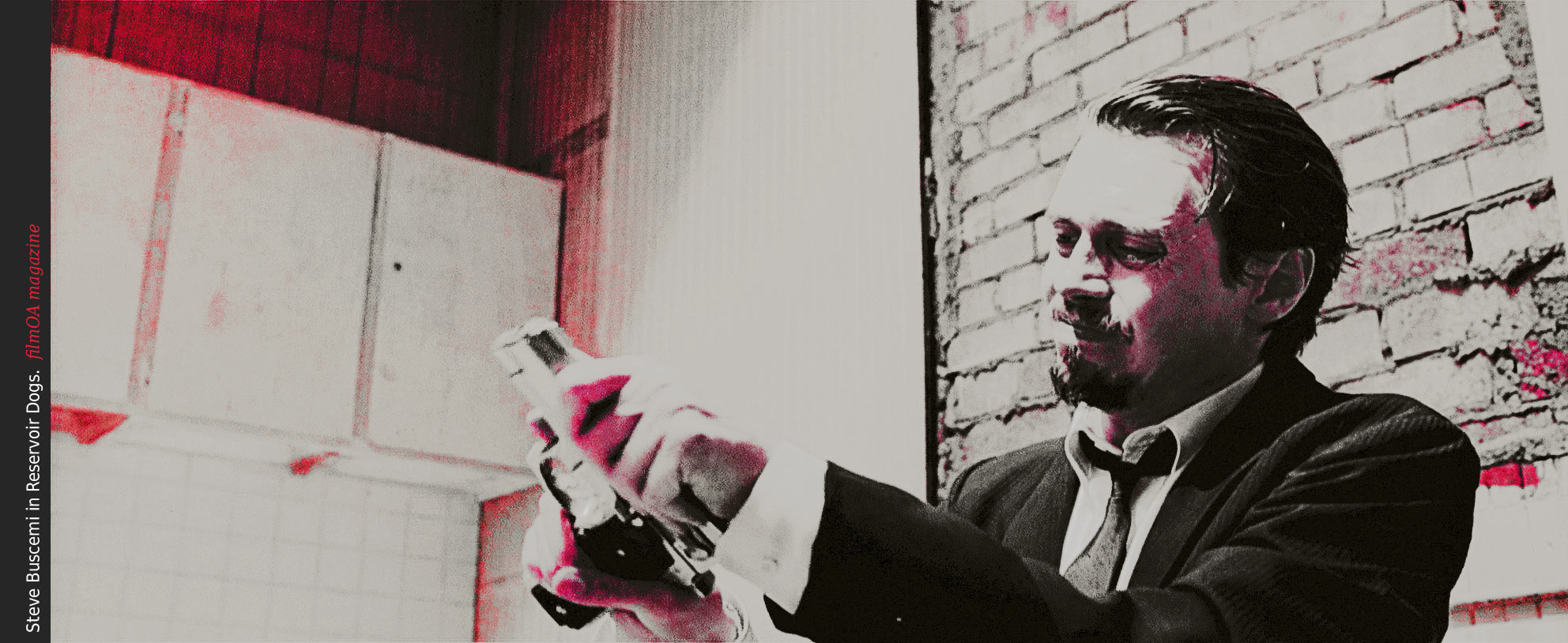Latest
Contact
filmOA v2.0

Steve Buscemi as Mr. Pink
filmOA | feature

It begins in a cafe. The camera dolly tracks around a table of eight tough guys smoking, drinking endless cups of coffee, and verbally jabbing one another. One of the many mundane topics of conversation we hear in this scene is about tipping. Mr. Pink refuses to tip. Why? The waitress wasn’t friendly enough and didn’t refill his coffee three times, something he has grown to expect. “I don’t tip because society says I have to. All right, if someone deserves a tip, I’ll give a little extra. But this tipping automatically, it’s for the birds.” Mr. Pink continues to be verbally insulted on his views on tipping until Steven Wright’s drone voice-over rudely interrupts and introduces Little Green Bag by The George Baker Selection. It’s at that moment when we hear that infamous bass line, see them eight guys get up from the table, strut out of the diner, wearing black ties, sunglasses, and almost walking in time to the beat, that we are truly introduced to the world of Quentin Tarantino.
Before Reservoir Dogs, Tarantino had previously written a film, True Romance and respectively sold it for less than what a New York taxi driver earns in a year. The decision behind him selling this piece of work was simply money. He didn’t go to film school, dropped out of high school, and worked a series of dead end jobs. In the late 1980’s, he began working in a video rental store, Video Archives, in Hollywood. In this shop, he’d spend most of his time watching films from all over the world. He cites this period of time as his film school. He learned how to craft a story, how to develop a character and after watching hundreds of films he ultimately learned how to make a film that had never been made before. It was also working here, that he met Roger Avary. Later, Avary would go onto help Tarantino write the Oscar winning screenplay for Pulp Fiction. But it was through a friend of a friend that Tarantino was introduced to Lawrence Bender, who would encourage Tarantino to make Reservoir Dogs.
Tarantino wrote the screenplay for Reservoir Dogs in just under three weeks. He passed the screenplay over the Lawrence Bender, who in turn passed it to a friend of a friend who ran a drama school. After a few people read it and passed it on themselves, it eventually landed in Harvey Kietel’s lap. Tarantino received a phone call from Kietel, who declared his love for the script and wanted in, but only if Tarantino gave him a role. Tarantino didn’t hesitate to accept Kietel’s offer. With Kietel on board this gave Tarantino legitimacy. Finding the money to make the film would, in theory, be an easier task now that someone of Keitel’s caliber was attached to the project. After many flights to and from New York for auditions, paid for by Kietel, Tarantino surrounded himself with a cast of misfits. With Kietel already on board, Tarantino had an actor who was in the middle of a career slump.
He also had four actors, Steve Buscemi, Chris Penn, Tim Roth and Michael Madsen, who had played nothing more than bit part roles in many Hollywood films, achieving minimal success. But Tarantino’s biggest coup was casting Lawrence Tierney as Joe Cabot, the spear head of the group. Notorious for his many portrayals of hardened criminals in 1940’s and 1950’s mob films, Tierney was also renowned for being hard to direct. Stories of Tierney and Tarantino having numerous busts up on set float around Hollywood folk law, but Tierney’s character, if nothing more, mirrored his own personal brushes with the law. This gave the audience a genuine sense that these are real bad guys.
